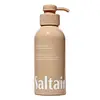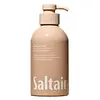What's inside
What's inside
 Key Ingredients
Key Ingredients

 Benefits
Benefits

 Concerns
Concerns

 Ingredients Side-by-side
Ingredients Side-by-side

Water
Skin ConditioningCocamidopropyl Betaine
CleansingSodium Cocoyl Isethionate
CleansingParfum
MaskingDecyl Glucoside
CleansingCrambe Abyssinica Seed Oil
Skin ConditioningCaryocar Brasiliense Fruit Oil
Skin ConditioningPlumeria Acutifolia Flower Extract
Skin ConditioningSodium Lauroyl Sarcosinate
CleansingPolyquaternium-7
Panthenol
Skin ConditioningPEG-150 Distearate
EmulsifyingPhenoxyethanol
PreservativeHydrolyzed Rice Protein
Skin ConditioningButylene Glycol
HumectantEthylhexylglycerin
Skin ConditioningPanthenyl Hydroxypropyl Steardimonium Chloride
Trigonella Foenum-Graecum Seed Extract
PerfumingHedera Helix Extract
AntimicrobialArctium Lappa Root Extract
Skin ConditioningEthyl Linoleate
EmollientEthyl Oleate
EmollientMaltodextrin
AbsorbentHydrolyzed Gardenia Florida Extract
AntioxidantPersea Gratissima Oil
Skin ConditioningHelianthus Annuus Seed Oil
EmollientGardenia Jasminoides Fruit Extract
Cosmetic ColorantSqualane
EmollientTetrasodium Glutamate Diacetate
Pentaerythrityl Tetra-Di-T-Butyl Hydroxyhydrocinnamate
AntioxidantTocopherol
AntioxidantCitric Acid
BufferingWater, Cocamidopropyl Betaine, Sodium Cocoyl Isethionate, Parfum, Decyl Glucoside, Crambe Abyssinica Seed Oil, Caryocar Brasiliense Fruit Oil, Plumeria Acutifolia Flower Extract, Sodium Lauroyl Sarcosinate, Polyquaternium-7, Panthenol, PEG-150 Distearate, Phenoxyethanol, Hydrolyzed Rice Protein, Butylene Glycol, Ethylhexylglycerin, Panthenyl Hydroxypropyl Steardimonium Chloride, Trigonella Foenum-Graecum Seed Extract, Hedera Helix Extract, Arctium Lappa Root Extract, Ethyl Linoleate, Ethyl Oleate, Maltodextrin, Hydrolyzed Gardenia Florida Extract, Persea Gratissima Oil, Helianthus Annuus Seed Oil, Gardenia Jasminoides Fruit Extract, Squalane, Tetrasodium Glutamate Diacetate, Pentaerythrityl Tetra-Di-T-Butyl Hydroxyhydrocinnamate, Tocopherol, Citric Acid
Water
Skin ConditioningCocamidopropyl Betaine
CleansingSodium C16 Olefin Sulfonate
EmulsifyingTheobroma Grandiflorum Seed Butter
Skin ConditioningPlumeria Acutifolia Flower Extract
Skin ConditioningAleurites Moluccanus Seed Oil
Skin ConditioningNiacinamide
SmoothingAscorbyl Glucoside
AntioxidantCandida Bombicola/Glucose/Methyl Rapeseedate Ferment
AntimicrobialSodium PCA
HumectantOlea Europaea Fruit Oil
MaskingHelianthus Annuus Seed Oil
EmollientMagnesium PCA
HumectantArgania Spinosa Kernel Oil
EmollientHydrolyzed Gardenia Florida Extract
AntioxidantZinc PCA
HumectantLithospermum Erythrorhizon Root Extract
Skin ConditioningGlycyrrhiza Uralensis Root Extract
Skin ConditioningAngelica Gigas Root Extract
Skin ConditioningSodium Hyaluronate
HumectantManganese PCA
HumectantGardenia Jasminoides Fruit Extract
Cosmetic ColorantPhenoxyethanol
PreservativeSodium Cocoyl Isethionate
CleansingSodium Benzoate
MaskingPEG-150 Distearate
EmulsifyingCitric Acid
BufferingTetrasodium Glutamate Diacetate
Maltodextrin
AbsorbentParfum
MaskingBenzyl Salicylate
PerfumingHexyl Cinnamal
PerfumingLinalool
PerfumingWater, Cocamidopropyl Betaine, Sodium C16 Olefin Sulfonate, Theobroma Grandiflorum Seed Butter, Plumeria Acutifolia Flower Extract, Aleurites Moluccanus Seed Oil, Niacinamide, Ascorbyl Glucoside, Candida Bombicola/Glucose/Methyl Rapeseedate Ferment, Sodium PCA, Olea Europaea Fruit Oil, Helianthus Annuus Seed Oil, Magnesium PCA, Argania Spinosa Kernel Oil, Hydrolyzed Gardenia Florida Extract, Zinc PCA, Lithospermum Erythrorhizon Root Extract, Glycyrrhiza Uralensis Root Extract, Angelica Gigas Root Extract, Sodium Hyaluronate, Manganese PCA, Gardenia Jasminoides Fruit Extract, Phenoxyethanol, Sodium Cocoyl Isethionate, Sodium Benzoate, PEG-150 Distearate, Citric Acid, Tetrasodium Glutamate Diacetate, Maltodextrin, Parfum, Benzyl Salicylate, Hexyl Cinnamal, Linalool
 Reviews
Reviews

Ingredients Explained
These ingredients are found in both products.
Ingredients higher up in an ingredient list are typically present in a larger amount.
Citric Acid is an alpha hydroxy acid (AHA) naturally found in citrus fruits like oranges, lemons, and limes.
Like other AHAs, citric acid can exfoliate skin by breaking down the bonds that hold dead skin cells together. This helps reveal smoother and brighter skin underneath.
However, this exfoliating effect only happens at high concentrations (20%) which can be hard to find in cosmetic products.
Due to this, citric acid is usually included in small amounts as a pH adjuster. This helps keep products slightly more acidic and compatible with skin's natural pH.
In skincare formulas, citric acid can:
While it can provide some skin benefits, research shows lactic acid and glycolic acid are generally more effective and less irritating exfoliants.
Most citric acid used in skincare today is made by fermenting sugars (usually from molasses). This synthetic version is identical to the natural citrus form but easier to stabilize and use in formulations.
Read more about some other popular AHA's here:
Learn more about Citric AcidCocamidopropyl Betaine is a fatty acid created by mixing similar compounds in coconut oil and dimethylaminopropylamine, a compound with two amino groups.
This ingredient is a surfactant and cleanser. It helps gather the dirt, pollutants, and other impurities in your skin to be washed away. It also helps thicken a product and make the texture more creamy.
Being created from coconut oil means Cocamidopropyl Betaine is hydrating for the skin.
While Cocamidopropyl Betaine was believed to be an allergen, a study from 2012 disproved this. It found two compounds in unpure Cocamidopropyl Betaine to be the irritants: aminoamide and 3-dimethylaminopropylamine. High-grade and pure Cocamidopropyl Betaine did not induce allergic reactions during this study.
Learn more about Cocamidopropyl BetaineWe don't have a description for Gardenia Jasminoides Fruit Extract yet.
Helianthus Annuus Seed Oil is the oil derived from the seeds of a Sunflower. Sunflower seed oil is non-fragrant. It is an emollient, meaning it helps to soften the skin.
Sunflower seed oil contains many fatty acids. The fatty acids found in sunflower seeds include (from highest amount to least): linoleic acid, myristic acid, palmitic acid, stearic acid, arachidic acid, oleic acid, and linolenic acid.
These fatty acids help the skin create ceramides. Ceramides play a role in repairing the skin barrier.
Helianthus Annuus Seed Oil helps moisturize the skin. This in turn helps the skin look more rejuvenated and smoother.
Sunflowers are rich in vitamin E.
Historians believe Indigenous cultures of North America domesticated sunflowers before corn. Thus they relied on sunflower oil for a variety of uses. One such use is moisturizing skin and hair.
Sunflower seed oil may not be fungal acne safe. We recommend speaking with a professional if you have any concerns.
Learn more about Helianthus Annuus Seed OilHydrolyzed Gardenia Florida Extract is an antioxidant.
Maltodextrin is a polysaccharide. It is derived from starch such as rice, corn, wheat, or potato starch.
In food, Maltodextrin is used to improve the texture and thicken a product. Due to its structure, it can help create a gel texture. As an emulsion stabilizer, it helps keep the ingredients in a product together.
As a polysaccharide, Maltodextrin has moisturizing properties. Polysaccharides are a type of carbohydrate. The top layer of skin uses polysaccharides to retain water, keeping the skin hydrated.
Maltodextrin is water soluble and has a sweet taste.
Learn more about MaltodextrinParfum is a catch-all term for an ingredient or more that is used to give a scent to products.
Also called "fragrance", this ingredient can be a blend of hundreds of chemicals or plant oils. This means every product with "fragrance" or "parfum" in the ingredients list is a different mixture.
For instance, Habanolide is a proprietary trade name for a specific aroma chemical. When used as a fragrance ingredient in cosmetics, most aroma chemicals fall under the broad labeling category of “FRAGRANCE” or “PARFUM” according to EU and US regulations.
The term 'parfum' or 'fragrance' is not regulated in many countries. In many cases, it is up to the brand to define this term.
For instance, many brands choose to label themselves as "fragrance-free" because they are not using synthetic fragrances. However, their products may still contain ingredients such as essential oils that are considered a fragrance by INCI standards.
One example is Calendula flower extract. Calendula is an essential oil that still imparts a scent or 'fragrance'.
Depending on the blend, the ingredients in the mixture can cause allergies and sensitivities on the skin. Some ingredients that are known EU allergens include linalool and citronellol.
Parfum can also be used to mask or cover an unpleasant scent.
The bottom line is: not all fragrances/parfum/ingredients are created equally. If you are worried about fragrances, we recommend taking a closer look at an ingredient. And of course, we always recommend speaking with a professional.
Learn more about ParfumPeg-150 Distearate is an emulsifier and thickening agent. It is created from stearic acid.
As an emulsifier, peg-150 distearate helps other ingredients dissolve. This helps prevent ingredient separation.
This ingredient may not be Malassezia folliculitis, or fungal-acne safe.
Learn more about PEG-150 DistearatePhenoxyethanol is a preservative that has germicide, antimicrobial, and aromatic properties. Studies show that phenoxyethanol can prevent microbial growth. By itself, it has a scent that is similar to that of a rose.
It's often used in formulations along with Caprylyl Glycol to preserve the shelf life of products.
We don't have a description for Plumeria Acutifolia Flower Extract yet.
Sodium cocoyl isethionate is a natural ingredient from coconut oil. It is an ultra gentle cleanser that gives a nice foam without drying the skin or impacting the skin barrier.
The amount of foam created depends on the amount of sodium cocoyl isethionate used in the product.
This ingredient also helps improve the spreadability of a product.
Learn more about Sodium Cocoyl IsethionateTetrasodium Glutamate Diacetate is a chelating agent. Chelating agents help prevent metal ions from binding to other ingredients. This helps prevent unwanted effects and reactions from a product. These metal ions may come from water and are found in miniscule amounts.
Tetrasodium Glutamate Diacetate can also help other preservatives be more effective.
Water. It's the most common cosmetic ingredient of all. You'll usually see it at the top of ingredient lists, meaning that it makes up the largest part of the product.
So why is it so popular? Water most often acts as a solvent - this means that it helps dissolve other ingredients into the formulation.
You'll also recognize water as that liquid we all need to stay alive. If you see this, drink a glass of water. Stay hydrated!
Learn more about Water